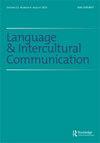Syrian refugees receiving information: an approach to dissemination of medical resources
IF 2.2
1区 文学
0 LANGUAGE & LINGUISTICS
引用次数: 1
Abstract
ABSTRACT Many refugees have unique health needs that may result from their resettlement. This study examined how Syrian refugees in the Cincinnati area prefer to receive medical information and the role that interpreters encompass in the doctor-patient relationship. Findings indicated that participants prefer to receive medical information via in-person interpreters, translated paper or digital materials, or text messages. Refugees from this study expressed that interpreters were commonly not present for medical visits and language confusion occasionally occurred even when they attended. Due to negative experiences, participants from this study did not always view interpreters as cultural brokers. العديد من اللاجئين لديهم احتياجات صحية فريدة قد تنتج عن إعادة توطينهم. درست هذه الدراسة كيف يفضل اللاجئون السوريون في منطقة سينسيناتي تلقي المعلومات الطبية والدور الذي يلعبه المترجمون الفوريون في العلاقة بين الطبيب والمريض. أشارت النتائج إلى أن المشاركين يفضلون تلقي المعلومات الطبية من خلال مترجمين شخصيًا أو ورق مترجَم أو مواد رقمية أو رسائل نصية. أعرب اللاجئون من هذه الدراسة عن عدم وجود المترجمين الفوريين للزيارات الطبية وأن الارتباك اللغوي يحدث أحيانًا حتى أثناء حضورهم. بسبب التجارب السلبية ، لم ينظر المشاركون في هذه الدراسة دائمًا إلى المترجمين الفوريين على أنهم وسطاء ثقافيون .接收信息的叙利亚难民:传播医疗资源的方法
ABSTRACT许多难民都有可能从重新安置中获得的统一健康需求。这项研究审查了辛辛那提地区的叙利亚难民如何能够获得医疗信息,以及解释者在医生与患者关系中的作用。调查结果表明,参与者首先通过个人受访者、书面或数字材料或短信接收医疗信息。来自这项研究的难民表示,受访者通常不进行医疗访问,有时会在他们受到影响时进行语言交流。由于消极的经验,这项研究的参与者并不总是将评论员视为文化经纪人。许多难民因重新安置而有独特的健康需求。这项研究考察了辛辛那提地区的叙利亚难民如何喜欢接收医疗信息,以及口译员在医患关系中发挥的作用。结果表明,参与者更喜欢通过翻译、翻译纸、数字材料或短信接收医疗信息。来自这项研究的难民表示,医疗访问没有口译员,即使他们在场,有时也会出现语言混乱。由于负面经历,这项研究的参与者并不总是将口译员视为文化调解人。
本文章由计算机程序翻译,如有差异,请以英文原文为准。
求助全文
约1分钟内获得全文
求助全文
来源期刊

Language and Intercultural Communication
Multiple-
CiteScore
3.00
自引率
47.40%
发文量
50
期刊介绍:
Language & Intercultural Communication promotes an interdisciplinary understanding of the interplay between language and intercultural communication. It therefore welcomes research into intercultural communication, particularly where it explores the importance of linguistic aspects; and research into language, especially the learning of foreign languages, where it explores the importance of intercultural perspectives. The journal is alert to the implications for education, especially higher education, and for language learning and teaching. It is also receptive to research on the frontiers between languages and cultures, and on the implications of linguistic and intercultural issues for the world of work.
 求助内容:
求助内容: 应助结果提醒方式:
应助结果提醒方式:


